Evidence-Based Nursing Research: Informal Care Support Analysis Report
VerifiedAdded on 2021/06/17
|6
|1030
|26
Report
AI Summary
This report provides an analysis of informal care in nursing, focusing on its increasing importance in healthcare due to rising costs and patient preferences. It reviews literature on the topic, highlighting the roles of informal caregivers, often family members, and their involvement in both episodic and long-distance care. The report discusses the stressors faced by caregivers and the benefits of specialist training and social support. It also examines the collaboration between nurses and informal carers. The study recommends that formally trained nurses guide informal carers to manage caseloads and minimize stress while ensuring patient safety. The conclusion emphasizes the significance of informal nursing care in supporting chronically ill patients and the need to provide adequate resources to informal carers. References to key studies are included, supporting the evidence-based approach of the report.
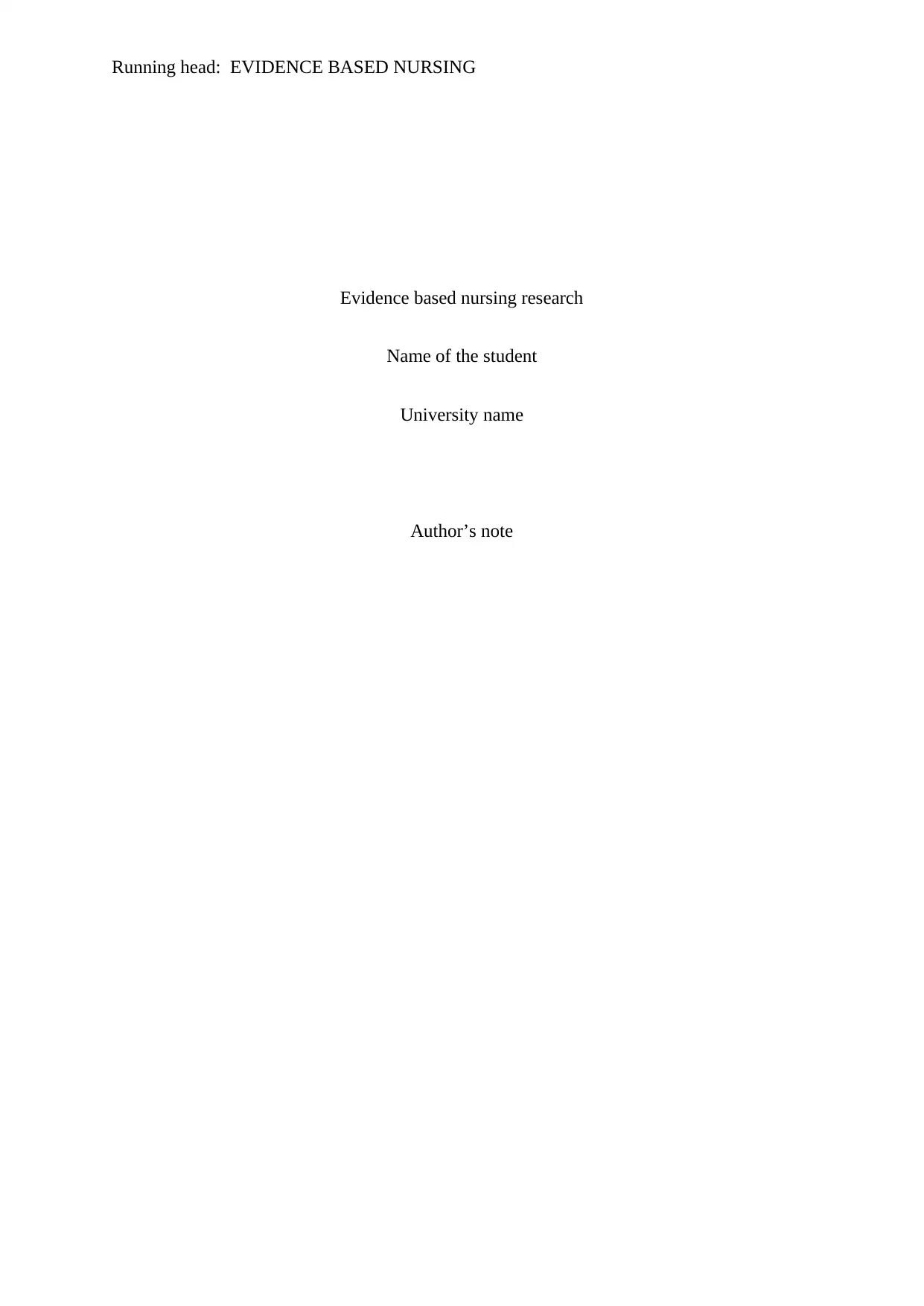
Running head: EVIDENCE BASED NURSING
Evidence based nursing research
Name of the student
University name
Author’s note
Evidence based nursing research
Name of the student
University name
Author’s note
Paraphrase This Document
Need a fresh take? Get an instant paraphrase of this document with our AI Paraphraser
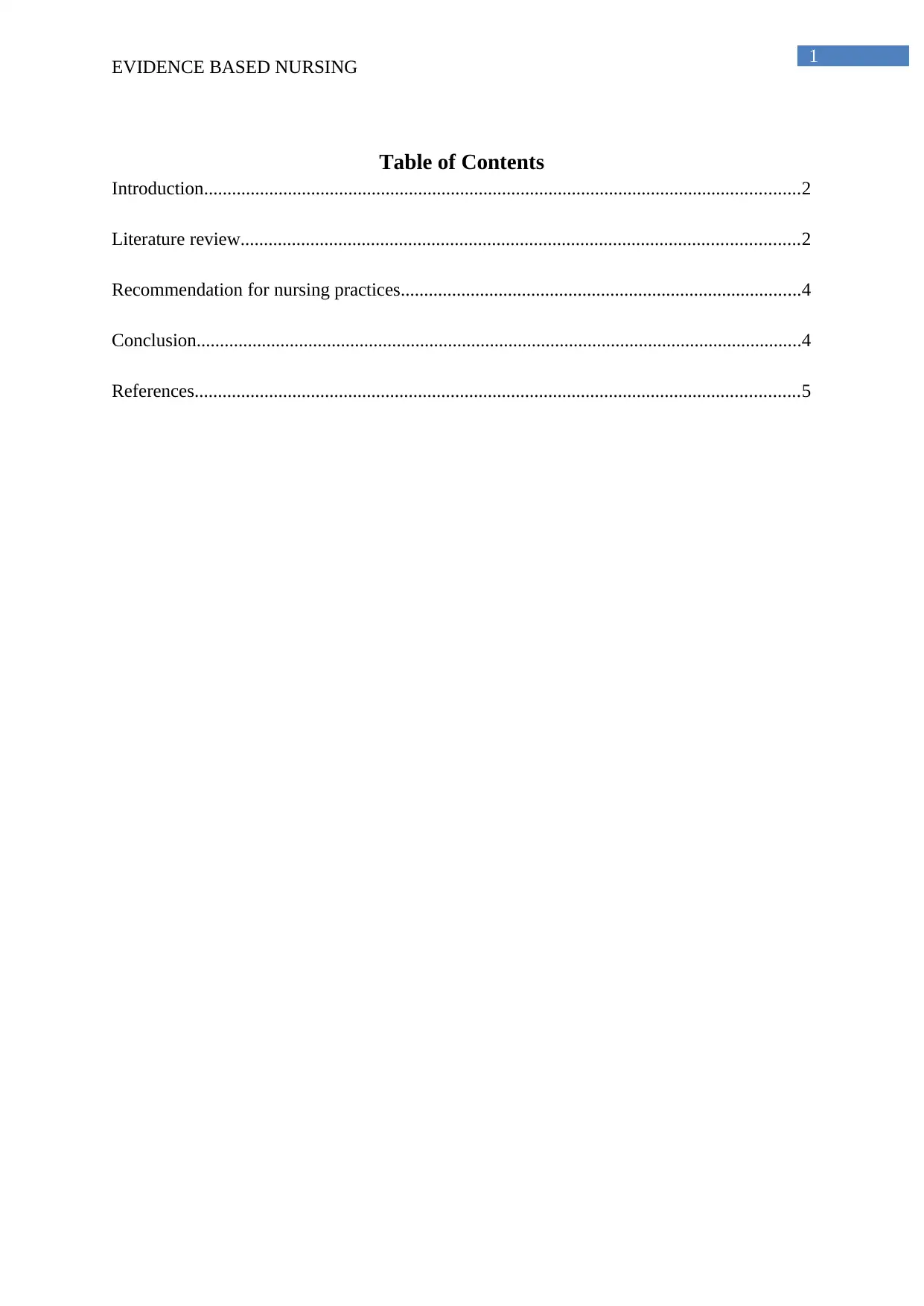
1
EVIDENCE BASED NURSING
Table of Contents
Introduction................................................................................................................................2
Literature review........................................................................................................................2
Recommendation for nursing practices......................................................................................4
Conclusion..................................................................................................................................4
References..................................................................................................................................5
EVIDENCE BASED NURSING
Table of Contents
Introduction................................................................................................................................2
Literature review........................................................................................................................2
Recommendation for nursing practices......................................................................................4
Conclusion..................................................................................................................................4
References..................................................................................................................................5
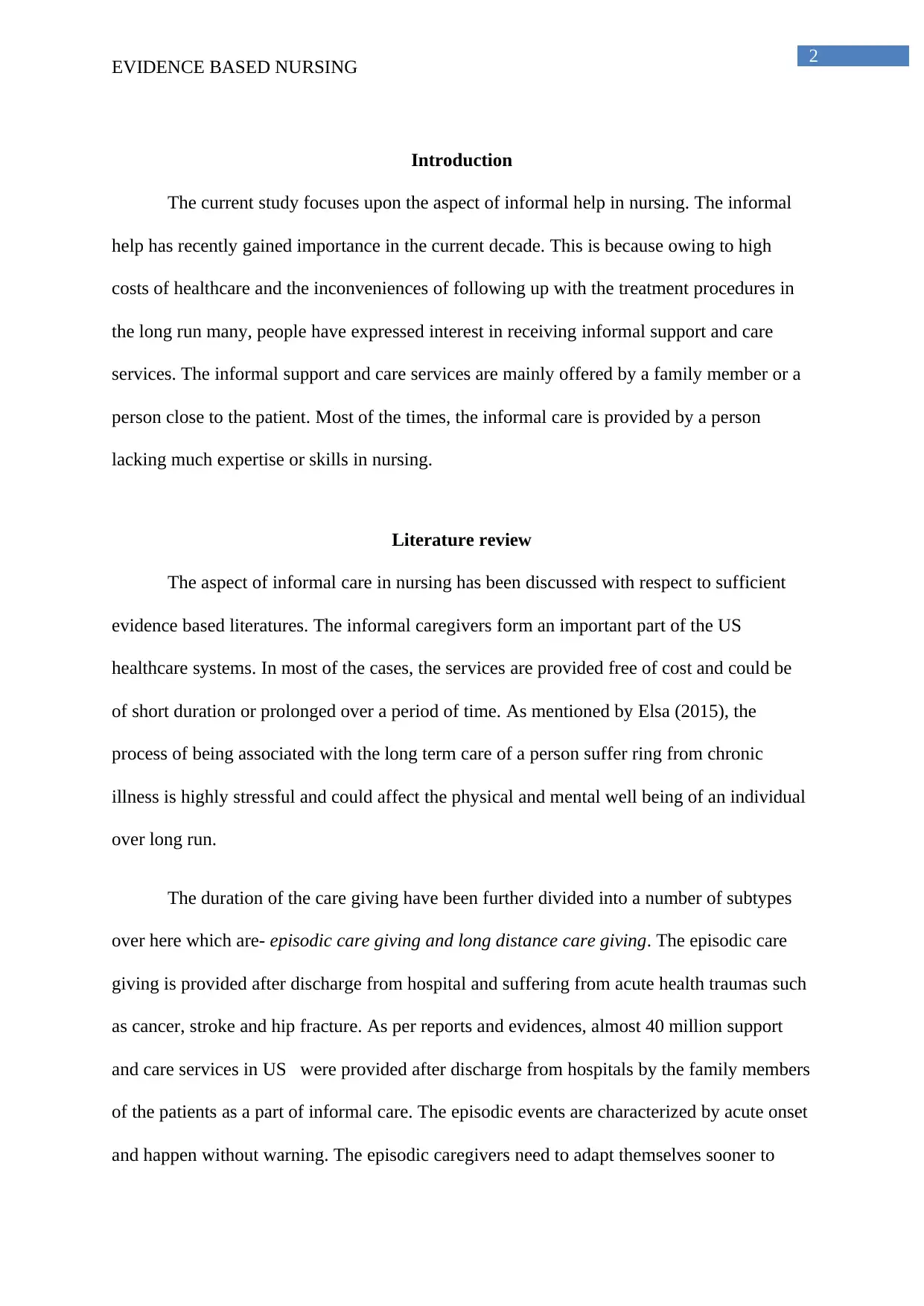
2
EVIDENCE BASED NURSING
Introduction
The current study focuses upon the aspect of informal help in nursing. The informal
help has recently gained importance in the current decade. This is because owing to high
costs of healthcare and the inconveniences of following up with the treatment procedures in
the long run many, people have expressed interest in receiving informal support and care
services. The informal support and care services are mainly offered by a family member or a
person close to the patient. Most of the times, the informal care is provided by a person
lacking much expertise or skills in nursing.
Literature review
The aspect of informal care in nursing has been discussed with respect to sufficient
evidence based literatures. The informal caregivers form an important part of the US
healthcare systems. In most of the cases, the services are provided free of cost and could be
of short duration or prolonged over a period of time. As mentioned by Elsa (2015), the
process of being associated with the long term care of a person suffer ring from chronic
illness is highly stressful and could affect the physical and mental well being of an individual
over long run.
The duration of the care giving have been further divided into a number of subtypes
over here which are- episodic care giving and long distance care giving. The episodic care
giving is provided after discharge from hospital and suffering from acute health traumas such
as cancer, stroke and hip fracture. As per reports and evidences, almost 40 million support
and care services in US were provided after discharge from hospitals by the family members
of the patients as a part of informal care. The episodic events are characterized by acute onset
and happen without warning. The episodic caregivers need to adapt themselves sooner to
EVIDENCE BASED NURSING
Introduction
The current study focuses upon the aspect of informal help in nursing. The informal
help has recently gained importance in the current decade. This is because owing to high
costs of healthcare and the inconveniences of following up with the treatment procedures in
the long run many, people have expressed interest in receiving informal support and care
services. The informal support and care services are mainly offered by a family member or a
person close to the patient. Most of the times, the informal care is provided by a person
lacking much expertise or skills in nursing.
Literature review
The aspect of informal care in nursing has been discussed with respect to sufficient
evidence based literatures. The informal caregivers form an important part of the US
healthcare systems. In most of the cases, the services are provided free of cost and could be
of short duration or prolonged over a period of time. As mentioned by Elsa (2015), the
process of being associated with the long term care of a person suffer ring from chronic
illness is highly stressful and could affect the physical and mental well being of an individual
over long run.
The duration of the care giving have been further divided into a number of subtypes
over here which are- episodic care giving and long distance care giving. The episodic care
giving is provided after discharge from hospital and suffering from acute health traumas such
as cancer, stroke and hip fracture. As per reports and evidences, almost 40 million support
and care services in US were provided after discharge from hospitals by the family members
of the patients as a part of informal care. The episodic events are characterized by acute onset
and happen without warning. The episodic caregivers need to adapt themselves sooner to
⊘ This is a preview!⊘
Do you want full access?
Subscribe today to unlock all pages.

Trusted by 1+ million students worldwide
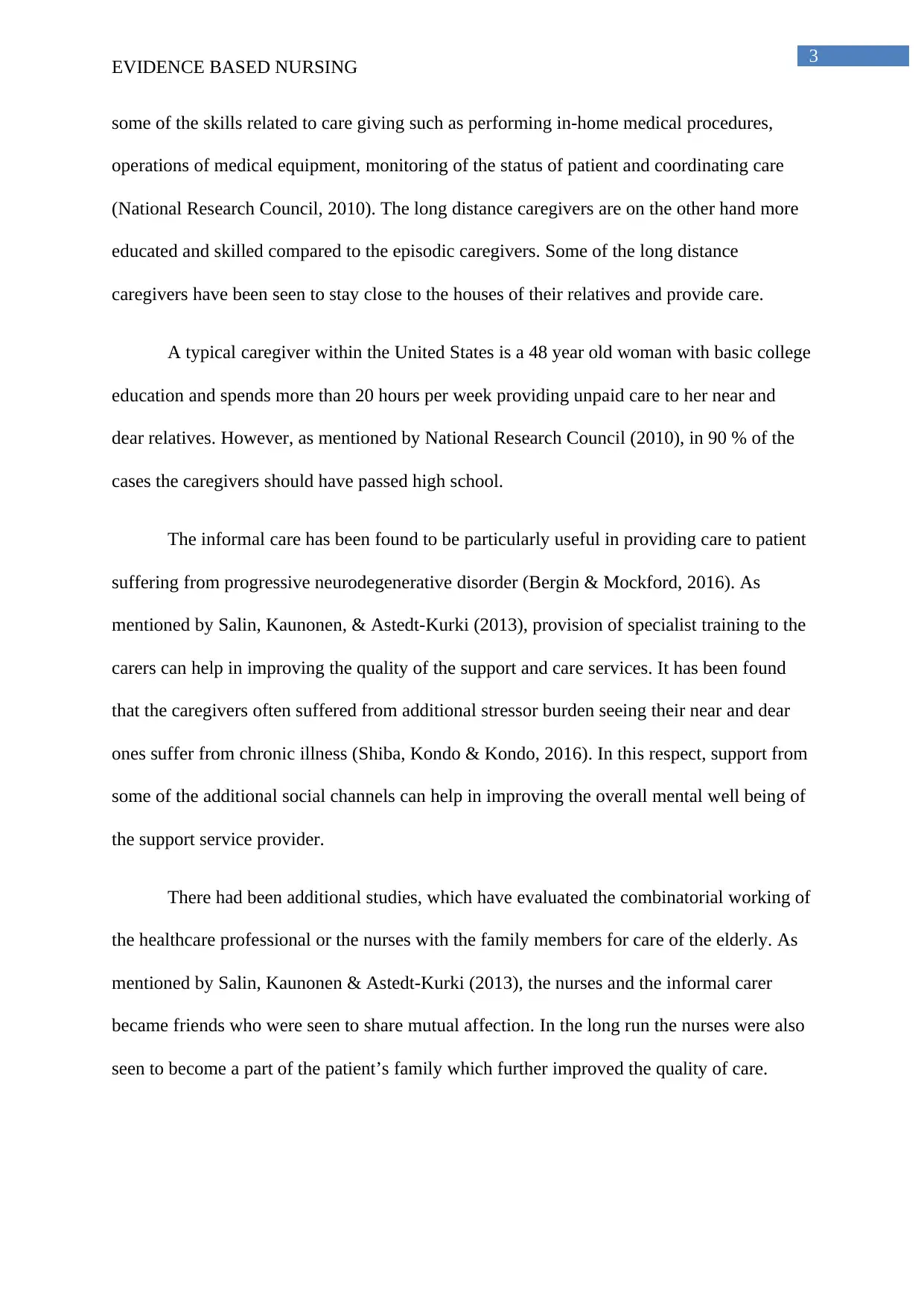
3
EVIDENCE BASED NURSING
some of the skills related to care giving such as performing in-home medical procedures,
operations of medical equipment, monitoring of the status of patient and coordinating care
(National Research Council, 2010). The long distance caregivers are on the other hand more
educated and skilled compared to the episodic caregivers. Some of the long distance
caregivers have been seen to stay close to the houses of their relatives and provide care.
A typical caregiver within the United States is a 48 year old woman with basic college
education and spends more than 20 hours per week providing unpaid care to her near and
dear relatives. However, as mentioned by National Research Council (2010), in 90 % of the
cases the caregivers should have passed high school.
The informal care has been found to be particularly useful in providing care to patient
suffering from progressive neurodegenerative disorder (Bergin & Mockford, 2016). As
mentioned by Salin, Kaunonen, & Astedt-Kurki (2013), provision of specialist training to the
carers can help in improving the quality of the support and care services. It has been found
that the caregivers often suffered from additional stressor burden seeing their near and dear
ones suffer from chronic illness (Shiba, Kondo & Kondo, 2016). In this respect, support from
some of the additional social channels can help in improving the overall mental well being of
the support service provider.
There had been additional studies, which have evaluated the combinatorial working of
the healthcare professional or the nurses with the family members for care of the elderly. As
mentioned by Salin, Kaunonen & Astedt-Kurki (2013), the nurses and the informal carer
became friends who were seen to share mutual affection. In the long run the nurses were also
seen to become a part of the patient’s family which further improved the quality of care.
EVIDENCE BASED NURSING
some of the skills related to care giving such as performing in-home medical procedures,
operations of medical equipment, monitoring of the status of patient and coordinating care
(National Research Council, 2010). The long distance caregivers are on the other hand more
educated and skilled compared to the episodic caregivers. Some of the long distance
caregivers have been seen to stay close to the houses of their relatives and provide care.
A typical caregiver within the United States is a 48 year old woman with basic college
education and spends more than 20 hours per week providing unpaid care to her near and
dear relatives. However, as mentioned by National Research Council (2010), in 90 % of the
cases the caregivers should have passed high school.
The informal care has been found to be particularly useful in providing care to patient
suffering from progressive neurodegenerative disorder (Bergin & Mockford, 2016). As
mentioned by Salin, Kaunonen, & Astedt-Kurki (2013), provision of specialist training to the
carers can help in improving the quality of the support and care services. It has been found
that the caregivers often suffered from additional stressor burden seeing their near and dear
ones suffer from chronic illness (Shiba, Kondo & Kondo, 2016). In this respect, support from
some of the additional social channels can help in improving the overall mental well being of
the support service provider.
There had been additional studies, which have evaluated the combinatorial working of
the healthcare professional or the nurses with the family members for care of the elderly. As
mentioned by Salin, Kaunonen & Astedt-Kurki (2013), the nurses and the informal carer
became friends who were seen to share mutual affection. In the long run the nurses were also
seen to become a part of the patient’s family which further improved the quality of care.
Paraphrase This Document
Need a fresh take? Get an instant paraphrase of this document with our AI Paraphraser
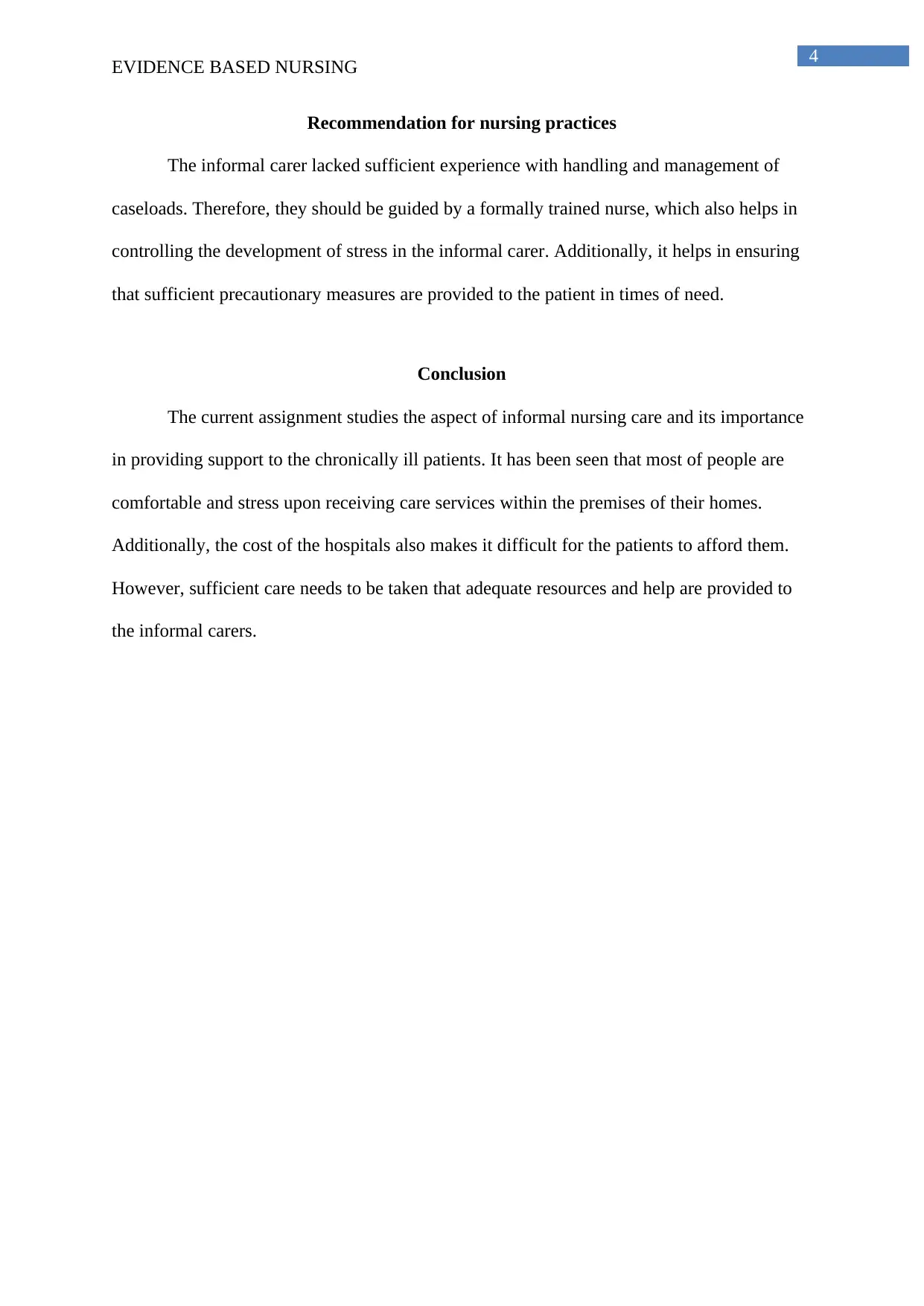
4
EVIDENCE BASED NURSING
Recommendation for nursing practices
The informal carer lacked sufficient experience with handling and management of
caseloads. Therefore, they should be guided by a formally trained nurse, which also helps in
controlling the development of stress in the informal carer. Additionally, it helps in ensuring
that sufficient precautionary measures are provided to the patient in times of need.
Conclusion
The current assignment studies the aspect of informal nursing care and its importance
in providing support to the chronically ill patients. It has been seen that most of people are
comfortable and stress upon receiving care services within the premises of their homes.
Additionally, the cost of the hospitals also makes it difficult for the patients to afford them.
However, sufficient care needs to be taken that adequate resources and help are provided to
the informal carers.
EVIDENCE BASED NURSING
Recommendation for nursing practices
The informal carer lacked sufficient experience with handling and management of
caseloads. Therefore, they should be guided by a formally trained nurse, which also helps in
controlling the development of stress in the informal carer. Additionally, it helps in ensuring
that sufficient precautionary measures are provided to the patient in times of need.
Conclusion
The current assignment studies the aspect of informal nursing care and its importance
in providing support to the chronically ill patients. It has been seen that most of people are
comfortable and stress upon receiving care services within the premises of their homes.
Additionally, the cost of the hospitals also makes it difficult for the patients to afford them.
However, sufficient care needs to be taken that adequate resources and help are provided to
the informal carers.
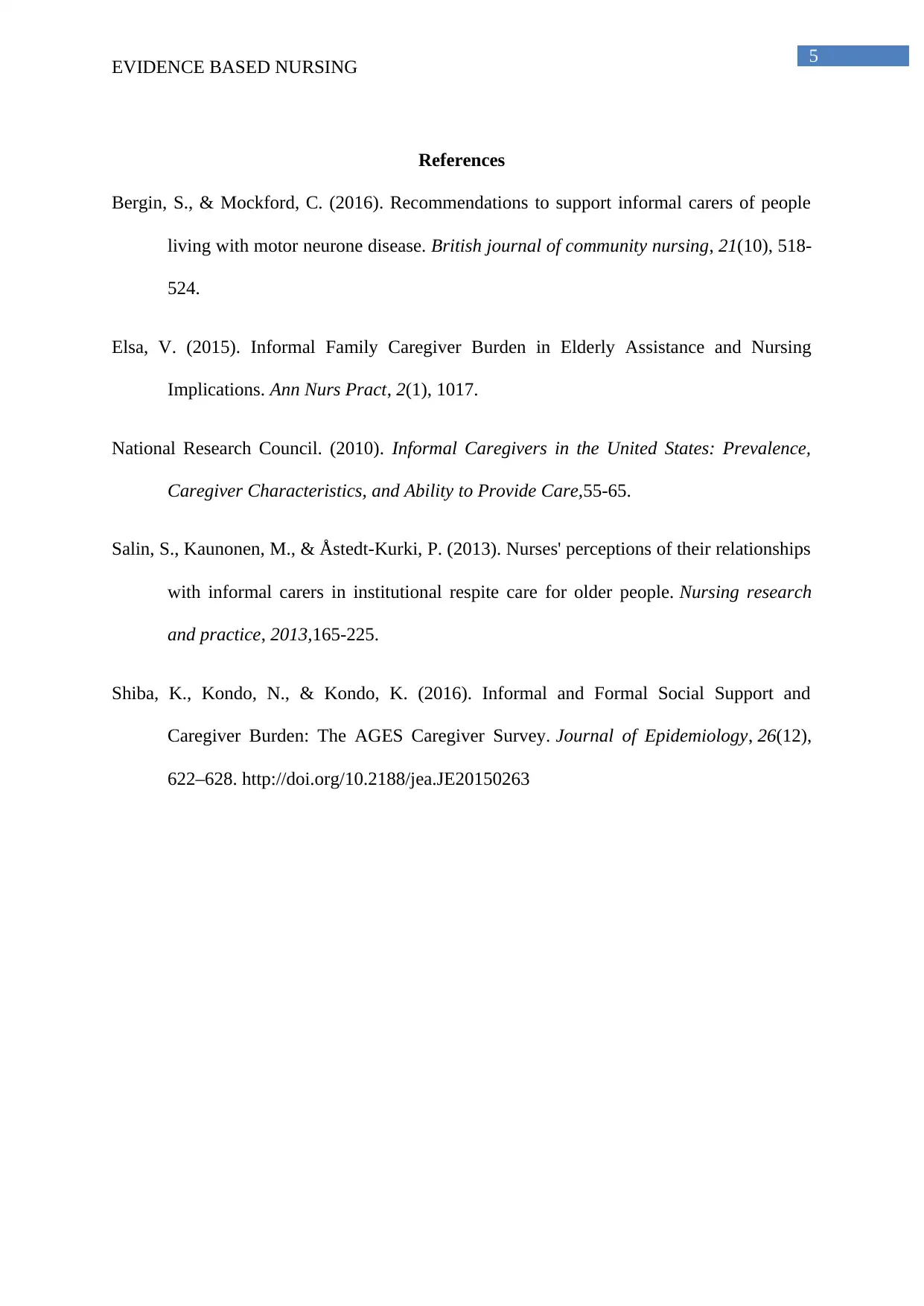
5
EVIDENCE BASED NURSING
References
Bergin, S., & Mockford, C. (2016). Recommendations to support informal carers of people
living with motor neurone disease. British journal of community nursing, 21(10), 518-
524.
Elsa, V. (2015). Informal Family Caregiver Burden in Elderly Assistance and Nursing
Implications. Ann Nurs Pract, 2(1), 1017.
National Research Council. (2010). Informal Caregivers in the United States: Prevalence,
Caregiver Characteristics, and Ability to Provide Care,55-65.
Salin, S., Kaunonen, M., & Åstedt-Kurki, P. (2013). Nurses' perceptions of their relationships
with informal carers in institutional respite care for older people. Nursing research
and practice, 2013,165-225.
Shiba, K., Kondo, N., & Kondo, K. (2016). Informal and Formal Social Support and
Caregiver Burden: The AGES Caregiver Survey. Journal of Epidemiology, 26(12),
622–628. http://doi.org/10.2188/jea.JE20150263
EVIDENCE BASED NURSING
References
Bergin, S., & Mockford, C. (2016). Recommendations to support informal carers of people
living with motor neurone disease. British journal of community nursing, 21(10), 518-
524.
Elsa, V. (2015). Informal Family Caregiver Burden in Elderly Assistance and Nursing
Implications. Ann Nurs Pract, 2(1), 1017.
National Research Council. (2010). Informal Caregivers in the United States: Prevalence,
Caregiver Characteristics, and Ability to Provide Care,55-65.
Salin, S., Kaunonen, M., & Åstedt-Kurki, P. (2013). Nurses' perceptions of their relationships
with informal carers in institutional respite care for older people. Nursing research
and practice, 2013,165-225.
Shiba, K., Kondo, N., & Kondo, K. (2016). Informal and Formal Social Support and
Caregiver Burden: The AGES Caregiver Survey. Journal of Epidemiology, 26(12),
622–628. http://doi.org/10.2188/jea.JE20150263
⊘ This is a preview!⊘
Do you want full access?
Subscribe today to unlock all pages.

Trusted by 1+ million students worldwide
1 out of 6
Related Documents
Your All-in-One AI-Powered Toolkit for Academic Success.
+13062052269
info@desklib.com
Available 24*7 on WhatsApp / Email
![[object Object]](/_next/static/media/star-bottom.7253800d.svg)
Unlock your academic potential
Copyright © 2020–2026 A2Z Services. All Rights Reserved. Developed and managed by ZUCOL.





